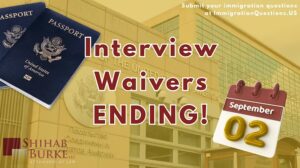Starting in 2020, U.S. Citizenship and Immigration Services (USCIS) started a new process employers must go through to apply for H-1B cap visa petitions. The electronic H-1B registration process is a preliminary step an employer must complete now (deadline March 25) before they can file H-1B visa petitions on behalf of foreign nationals with specialized degrees (also known as “requested workers”) who have never had H-1B status.
Once the registrant (employer) has submitted an electronic H-1B registration for each beneficiary (requested worker), and paid the required $10 per beneficiary, you must wait to hear back whether your registration has been selected via a lottery process. If selected, the registrant can then file the H-1B visa petition.
It is important to note that submitting an H-1B registration through the USCIS website does not guarantee that you will be selected. In fact, based on last year’s experience, the odds of being selected in the H-1B lottery range from about 50% for certain U.S. master’s graduates (referred to as “master’s cap eligible”) to about 35% for those not holding US master’s degrees from accredited not-for-profit or public universities.
This process requires careful attention to various details and timelines; therefore, we have gathered the top questions about H-1B registration with helpful answers below.
Q: When should I register and when can I file the H-1B petition if I am selected?
A: There are several key dates to remember.
- March 9, 2021 at 12pm ET – registration opens.
- March 25, 2021 at 12pm ET – registration closes.
- March 31, 2021 – USCIS notifies selected registrants by this date.
- Status update will be available on your online account, so keep your username and password handy!
- April 1, 2021 – earliest day an H-1B visa petition can be filed for fiscal year 2022. Only selected registrations can file.
- June 30, 2021 – the last day an H-1B petition can be filed.
- Remember this is the end of the 90-day window during which selected registrants can file their H-1B petitions.
- Keep this “90-day rule” in the back of your mind, it applies to satisfying the master’s cap eligibility requirements.
- October 1, 2021 – employment start date that must be listed on the H-1B petition if your selected registration was submitted between March 9-25.
- October 1 is the start of the 2022 fiscal year for the U.S. government, therefore the H-1B cap season is referred to as “FY 2022” even though the registration and petition are filed in 2021.
- Based on last year’s experience, if any other employment start date is listed on your petition, it will be denied.
Q: How do I complete the H-1B registration?
A: A beneficiary (person wishing to get an H-1B visa) cannot register for the lottery nor file their own petition. Instead, the company that wishes to hire the prospective employee must create an account on my.uscis.gov and provide the following information for each beneficiary:
Employer (registrant):
- Full legal entity name
- DBA (doing business as) name (if applicable)
- Headquarters address
- Signatory’s:
- Full legal name
- Title
- Phone number
- Address
Employee (beneficiary):
- Full legal name
- Gender
- Date of birth
- Country of birth
- Country of citizenship
- Passport number
- Whether they are master’s or bachelor’s cap eligible
NOTE: registrants must make sure to use the signatory’s email address (for example: [email protected]) NOT a general or group email, such as [email protected]. Further, an account may not be shared by multiple users.
Q: Can I use the registration account I created last year?
A: Maybe. As there are several types of USCIS accounts, you must make sure the type of account you have is “I am an H-1B registrant” as this is the only type of account that can be used to prepare and submit H-1B registrations. Not using the correct account was one of the biggest user errors during last year’s registration period.
Refer to this step-by-step guide on how to create your myUSCIS account.
Q: Does my master’s degree make me eligible for the H-1B visa?
A: The short answer is—it depends. Not all master’s degrees make you eligible for one of the 20,000 H-1B visas reserved for higher education graduates. To be eligible for the master’s cap, you need to make sure that at the time of H-1B petition filing (which occurs after the registration and lottery selection):
- You will have completed all the requirements of the degree.
- The degree must be issued by a U.S. institution.
- The school must be public or not-for-profit.
- Degrees from private institutions will make you ineligible for the master’s cap.
- The school must be accredited by a national accrediting agency.
Q: How long after selection can the H-1B visa petition be filed?
A: The application window for selected registrations is 90 days (April 1 – June 30, 2021). This is good news for beneficiaries who have not yet completed the requirements for a master’s degree at the time of registration. For example, if you have a thesis defense or final test coming up, you have 90 days (about three months) to complete your master’s requirements and file the petition.
Students, whose student visas will expire prior to the 90-day period, do not have the full 90 days to file their petitions. The petition must be filed before the student visa status expires. It is best to consult an experienced immigration law firm such as Shihab Burke LLC Immigration Lawyers to ensure compliance with all H-1B regulations.
Q: Can an employer register the same beneficiary more than once?
A: No. Each beneficiary can be registered only once by the same employer. Submitting multiple registrations for one beneficiary in hopes of increasing the odds of being selected will result in a rejection of all the registrations for that beneficiary.
But mistakes do happen. If the registrant mistakenly registers the same beneficiary more than once and catches this mistake before the registration window closes (March 25), they will need to withdraw all the registrations for that particular beneficiary and re-submit.
As of now, the electronic registration system does not provide a warning if multiple registrations are submitted for the same person. Therefore, the burden is on the registrant to make sure duplicate registrations are not submitted.
Q: Can two related companies register the same person?
A: The answer is “maybe” but with an important note of caution. The related companies must register the same employee for different opportunities, and each entity must have a legitimate business need for the filing. Example: Company A and Company B are related (one is a parent company of the other). If each one registers one beneficiary for different opportunities, meaning with different end clients and different vendors, then that is potentially allowed.
Because the burden is on the employer to prove a legitimate business need, there is always a risk in this approach and should be carefully considered. You may consult with an experienced immigration attorney such as Shihab Burke LLC Immigration Lawyers to help you make this determination.
Q: Can two unrelated companies register the same person?
A: Yes, but again, there is an exception! Even if there is no legal relation between the two companies, if they register the same beneficiary for the same opportunity (working for the same end client and same vendor) then those companies can be considered related and therefore prohibited from registering the same person. This rule is relatively recent, put forth by the Administrative Appeals Office (AAO) in 2018. For more details, please refer to the AAO memo on the Matter of S- Inc.
Q: Must the registrant file an H-1B petition for every selected registration?
A: No, but USCIS is aware of the possibility of fraud when not every selected registration is followed with a H-1B filing. When an employer submits registrations, they attest to having good faith intent to file a petition for every person registered. If a pattern of registering and not filing emerges, USCIS may start an investigation which can result in criminal sanctions or a bar from future H-1B visa petitions.
Q: How many H-1B registrations can a company submit?
A: Up to 250 beneficiaries may be registered in one batch. There is no limit on the total number of registrations a company can submit.
Q: Why was this new electronic registration put in place?
A: To save time, money, and resources. Before this electronic registration system, H-1B visa petitions were filed for anyone wishing to apply. For example: out of the 250,000 petitions filed in 2019, only 85,000 of those were approved. Meaning a large chunk of petitions that were rejected for non-selection had to be mailed back.
The registration process attempts to streamline the process by reviewing only the petitions filed because of a selected registration. The result is reduced paperwork and data exchange, along with a much welcome cost savings for employers.
We Are Here to Help
This is a lot of information, yet this is just a high-level overview. There are other nuances and details which should not be overlooked, therefore it is advisable to work with an experience immigration law firm, like Shihab Burke LLC Immigration Lawyers. We can help you make this process smooth sailing and ensure you comply with all the requirements of the H-1B visa registration and petition. Contact us today!
If you’d like more information, you can also refer to the USCIS H-1B registration page.









